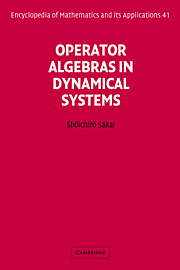4 - C*-dynamical systems
Published online by Cambridge University Press: 27 March 2010
Summary
Introduction
In this chapter, we shall discuss a unified axiomatic treatment of quantum lattice systems and quasi-free dynamics in Fermion field theory within the framework of C*-dynamical systems. In these systems, time evolution, equilibrium states (KMS states), ground states, stability under bounded perturbations and phase transitions are important physical notions. Here we shall present an abstract treatment of these notions within the theory of C*-dynamical systems. About time evolution, we shall emphasize the approximate innerness property for the corresponding time automorphism group in a given C*-dynamical system. In fact, the approximate innerness assures the existence of a ground state, and the existence of a KMS state at each inverse temperature under the assumption of ‘the existence of a tracial state’, which is always satisfied in quantum lattice systems and in canonical anticommutation relation algebras.
We shall also discuss in detail one of the most important open problems (the Powers-Sakai conjecture) in C*-dynamical systems. In each section we shall explain relations between C*-dynamical systems and physical systems. For simplicity we shall assume that every C*-algebra has an identity (unless otherwise stated).
Approximately inner C*-dynamics
A quantum lattice system consists of a set of particles confined to a lattice and interacting at distance. There are two physical interpretations of these models. One is a lattice gas and the other is a spin system. The lattice gas views each point of the lattice as a possible site for a finite number of AT-particles, i.e. each point of the configuration space can be empty or occupied by 1, 2, …, N -particles.
- Type
- Chapter
- Information
- Operator Algebras in Dynamical Systems , pp. 101 - 207Publisher: Cambridge University PressPrint publication year: 1991

